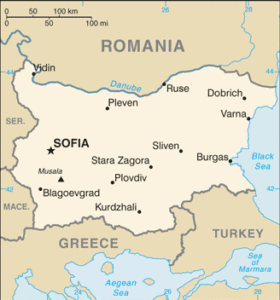 Bulgaria, can trace its Jewish community back to the time of Caligula in the first century CE. At the time of the final Turkish conquest of Bulgaria, in 1396, Jews were living in Vidin, Nikopol, Silistra, Pleven, Sofia, Yambol, Philippopolis (now Plovdiv), and Stara Zagora. Jewish refugees came to Bulgaria from Bavaria, which had banished them in 1470. Spanish Jews reached Bulgaria after 1494. Others came to Bulgaria from Salonika, through Macedonia, and from Italy, through Ragusa and Bosnia. Until 1640 Sofia had three separate Jewish communities – the Romaniots, the Ashkenazim, and the Sephardim.
Bulgaria, can trace its Jewish community back to the time of Caligula in the first century CE. At the time of the final Turkish conquest of Bulgaria, in 1396, Jews were living in Vidin, Nikopol, Silistra, Pleven, Sofia, Yambol, Philippopolis (now Plovdiv), and Stara Zagora. Jewish refugees came to Bulgaria from Bavaria, which had banished them in 1470. Spanish Jews reached Bulgaria after 1494. Others came to Bulgaria from Salonika, through Macedonia, and from Italy, through Ragusa and Bosnia. Until 1640 Sofia had three separate Jewish communities – the Romaniots, the Ashkenazim, and the Sephardim.
In the 1880 census, just more than 20 500 Bulgarian Jews were recorded, and at the time, the number was on the rise. By the mid-1880s founded the first Consistory of the Jews in Bulgaria. After 1878 a chief rabbinate was created, headed by a chief rabbi. In 1900, a conference of Jewish communities assembled and approved a new constitution, to deal with elections to synagogue, community, and school committees, but it was not recognised by the Bulgarian government. After Bulgaria defeated the Russian-Turkish War of 1877-78, the Sultan lost hold of Bulgaria. With this the new Bulgarian government praised the Jewish community for helping to defend Sofia from the Turks. The community continued to grow over the next 50 years, receiving many Jewish refugees from the former Ottoman Empire.
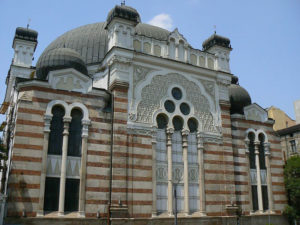 Early on in the Second World War, Bulgaria was a member of the Axis powers, having signed the Tripartite Pact on March 1, 1941. However, Bulgaria was not emotionally attached to the ideals of the major Axis powers. They simply signed on because they desired, and were guaranteed by Germany, the nearby territories of Thrace and Macedonia, which they had lost after their defeat in World War One. As a result, though Hitler was certainly a persuasive influence on Bulgaria’s foreign and domestic policy, he was not quite dictating every action taken by Bulgaria’s ruler, Tsar Boris III.
Early on in the Second World War, Bulgaria was a member of the Axis powers, having signed the Tripartite Pact on March 1, 1941. However, Bulgaria was not emotionally attached to the ideals of the major Axis powers. They simply signed on because they desired, and were guaranteed by Germany, the nearby territories of Thrace and Macedonia, which they had lost after their defeat in World War One. As a result, though Hitler was certainly a persuasive influence on Bulgaria’s foreign and domestic policy, he was not quite dictating every action taken by Bulgaria’s ruler, Tsar Boris III.
At this time there were 48,565 Jews in Bulgaria, with more than half of them residing in Sofia. Unlike most European countries at the time, Bulgarian Jews were fully integrated into Bulgarian society, though they numbered only about 1% of the total population of the country. There was a much lower rate of anti-Semitism in the country and Bulgarian intellectuals purposefully promoted tolerance of the Jewish population as something of which to be proud. Even the Orthodox Church and the Jewish Synagogues tended to get along quite well.
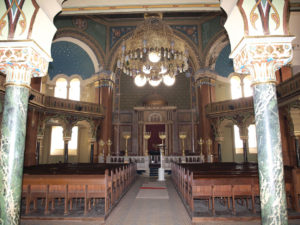 Due to Bogdan Filov, a Germanophile, in July 1940 the government announced its decision to curb the freedom of the Jewish minority. In August of the same year the cabinet approved the anti-Jewish “Law for the Protection of the Nation,” patterned after Nazi regulations. Among other things, this order prohibited significant Jewish economic and professional activity, restricted where they could live, and enforced strict confiscatory measures on their possessions. The anti-Semitic rules were, at first, only minimally enforced. Many Bulgarians brought food to their Jewish friends who, thanks to the oppressive Nazi regime, were no longer were able to provide for themselves.
Due to Bogdan Filov, a Germanophile, in July 1940 the government announced its decision to curb the freedom of the Jewish minority. In August of the same year the cabinet approved the anti-Jewish “Law for the Protection of the Nation,” patterned after Nazi regulations. Among other things, this order prohibited significant Jewish economic and professional activity, restricted where they could live, and enforced strict confiscatory measures on their possessions. The anti-Semitic rules were, at first, only minimally enforced. Many Bulgarians brought food to their Jewish friends who, thanks to the oppressive Nazi regime, were no longer were able to provide for themselves.
Public reaction to this legislation was fierce and one-sided. Citizens, and particularly the many intellectuals that took pride in Bulgaria’s tolerance of the Jewish population, were vehemently opposed to the new law. Joining the intellectuals in letter-writing and petition campaigns were the Bulgarian Workers Party (the Communist party), several professional organizations, and the Bulgarian Orthodox Church.
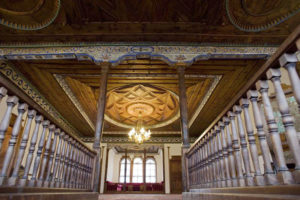 In the fall of 1942, the Nazis decided to push harder and forced the establishment of a Commissariat for Jewish Relations. The Commissar’s primary function was to oversee the deportation of Bulgarian Jews to Nazi death camps. In early 1943, Commissar Belev, a fiercely anti-Semitic Bulgarian, signed a secret agreement with Germany arranging sudden deportation action. Belev’s quota was more than 20,000 Jews. About 11,000 Jews were swiftly transferred from the colonies in Thrace and Macedonia to death camps. Very few survived. However, this left Belev more than 9,000 short of his quota – he would have to deport Jews from Bulgaria itself.
In the fall of 1942, the Nazis decided to push harder and forced the establishment of a Commissariat for Jewish Relations. The Commissar’s primary function was to oversee the deportation of Bulgarian Jews to Nazi death camps. In early 1943, Commissar Belev, a fiercely anti-Semitic Bulgarian, signed a secret agreement with Germany arranging sudden deportation action. Belev’s quota was more than 20,000 Jews. About 11,000 Jews were swiftly transferred from the colonies in Thrace and Macedonia to death camps. Very few survived. However, this left Belev more than 9,000 short of his quota – he would have to deport Jews from Bulgaria itself.
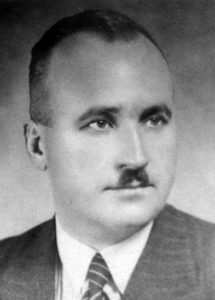 Word of the deportations began to spread. Three days before the deportation was scheduled and as arrests of Jews were taking place across Bulgaria, a large delegation of non-Jewish Bulgarians set out to protest against the deportations to the Deputy Speaker of Parliament, Dimitar Peshev. On March 17, Peshev presented the prime minister with a petition against the deportations signed by 42 deputies. Political figures outside Parliament and prominent figures from the Greek Orthodox Church hierarchy joined in the effort. Under the pressure, the government of Bogdan Filov decided on a compromise. It ordered all deportations of Bulgarian Jews to be stopped.
Word of the deportations began to spread. Three days before the deportation was scheduled and as arrests of Jews were taking place across Bulgaria, a large delegation of non-Jewish Bulgarians set out to protest against the deportations to the Deputy Speaker of Parliament, Dimitar Peshev. On March 17, Peshev presented the prime minister with a petition against the deportations signed by 42 deputies. Political figures outside Parliament and prominent figures from the Greek Orthodox Church hierarchy joined in the effort. Under the pressure, the government of Bogdan Filov decided on a compromise. It ordered all deportations of Bulgarian Jews to be stopped.
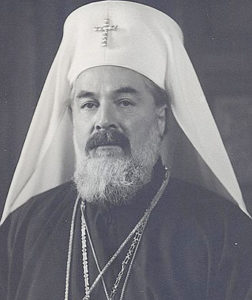 On March 10, boxcars were loaded with 8,500 Jews, including 1,500 from the city of Plovdiv. The bishop of Plovdiv, Metropolitan Kirill (later Patriarch of the Bulgarian Orthodox Church), along with 300 church members, showed up at the station where the Jews were awaiting transport. Kirill pushed through the SS officers guarding the area his authority and courage were such that no one dared stop him and made his way to the Jews inside the boxcars. Kirill next walked to the front of the train, declaring he would lie down on the tracks if the train started to move. The Jews were eventually freed.
On March 10, boxcars were loaded with 8,500 Jews, including 1,500 from the city of Plovdiv. The bishop of Plovdiv, Metropolitan Kirill (later Patriarch of the Bulgarian Orthodox Church), along with 300 church members, showed up at the station where the Jews were awaiting transport. Kirill pushed through the SS officers guarding the area his authority and courage were such that no one dared stop him and made his way to the Jews inside the boxcars. Kirill next walked to the front of the train, declaring he would lie down on the tracks if the train started to move. The Jews were eventually freed.
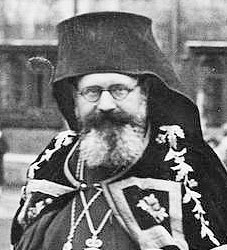 Tsar Boris III was initially inclined to continue with the planned deportations. The Rescue of about 50,000 Jews living on Bulgarian soil during World War II, was carried out with the help of Dimitar Peshev and Exarch Stefan of Bulgaria and Kiril, Metropolitan of Plovdiv, who managed to overcome Bulgaria’s pro-Nazi bureaucracy and convince the then Tsar Boris III to stand behind Bulgarian Jewry.
Tsar Boris III was initially inclined to continue with the planned deportations. The Rescue of about 50,000 Jews living on Bulgarian soil during World War II, was carried out with the help of Dimitar Peshev and Exarch Stefan of Bulgaria and Kiril, Metropolitan of Plovdiv, who managed to overcome Bulgaria’s pro-Nazi bureaucracy and convince the then Tsar Boris III to stand behind Bulgarian Jewry.
Though Tsar Boris was able to deflect Nazi pressure for Jewish deportation, he was forced to make some concessions to the anti-Semitic Germans in order to maintain his alliance. He cited labour shortages as the reason for refusing to transfer Bulgarian Jews into German custody and in 1942, several hundred young Jews were sent to forced labour, and in January 1943, young conscripts were sent to Bulgaria to work on road construction. Every town with a Jewish population had its commissioner for Jewish affairs, whose task it was to ensure that the anti-Jewish orders were properly carried out. Food was enough, but of incredibly poor quality. Among the warders, most of them retired officers and sergeants, there were beasts, but also regular Bulgarians, who made every effort to alleviate the plight of the Jews. While Jews worked hard in labour camps, they all survived the Holocaust.
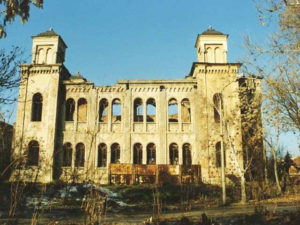 An angry Hitler summoned Tsar Boris to Germany, where the Reich’s foreign minister, Joachim von Ribbentrop, pressured the Tsar to revise his decision. The King refused. This resulted in an angry showdown with Hitler. The Tsar was flown back to Bulgaria, to die a few days later from a mysterious illness. Bulgaria’s unofficial version is that Boris was poisoned by Hitler.
An angry Hitler summoned Tsar Boris to Germany, where the Reich’s foreign minister, Joachim von Ribbentrop, pressured the Tsar to revise his decision. The King refused. This resulted in an angry showdown with Hitler. The Tsar was flown back to Bulgaria, to die a few days later from a mysterious illness. Bulgaria’s unofficial version is that Boris was poisoned by Hitler.
In 1944, massive allied bombing of Bulgaria began, and plans to deport the Jews were completely shelved. At that time, a small number of Jewish families were permitted to leave the country for Palestine. After World War II, in consequence of the agreements between Stalin, Churchill, and Roosevelt, Bulgaria fell under the sphere of influence of the Soviet Union. Over the years 1948 to 1951, more than 24,000 Jews migrated to Israel. The mass exodus continued until only a few thousand Jews remained in the country.
At the end of the period of Communist rule, in October 1989, nearly 4,000 Jews emigrated in Israel. Until the upheavals in Sofia in February and March 1990, the foreign relations of the Bulgarian Jewish community remained very limited.
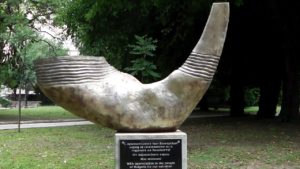 The Bulgarian Jewish community today numbers 2,000-6,000 Jews. Most Jews live in Sofia but there are smaller communities in Plovdiv, Varna, Burgas and Ruse. The Bulgarian Jewish community has steadily grown in recent years with a focused effort on restoring communal Jewish knowledge. Since 1992, the small population has been revitalized into a vibrant religious and cultural community. The level of religious observance in Bulgaria is low, and many Bulgarian Jews come from mixed marriages. Most Bulgarian Jews identify themselves in a national-ethnic rather than a religious context. There are only two functioning synagogues in Bulgaria, in Sofia and Plovdiv. Services are held on Shabbat, but most Jews only congregate on important Jewish holidays.
The Bulgarian Jewish community today numbers 2,000-6,000 Jews. Most Jews live in Sofia but there are smaller communities in Plovdiv, Varna, Burgas and Ruse. The Bulgarian Jewish community has steadily grown in recent years with a focused effort on restoring communal Jewish knowledge. Since 1992, the small population has been revitalized into a vibrant religious and cultural community. The level of religious observance in Bulgaria is low, and many Bulgarian Jews come from mixed marriages. Most Bulgarian Jews identify themselves in a national-ethnic rather than a religious context. There are only two functioning synagogues in Bulgaria, in Sofia and Plovdiv. Services are held on Shabbat, but most Jews only congregate on important Jewish holidays.